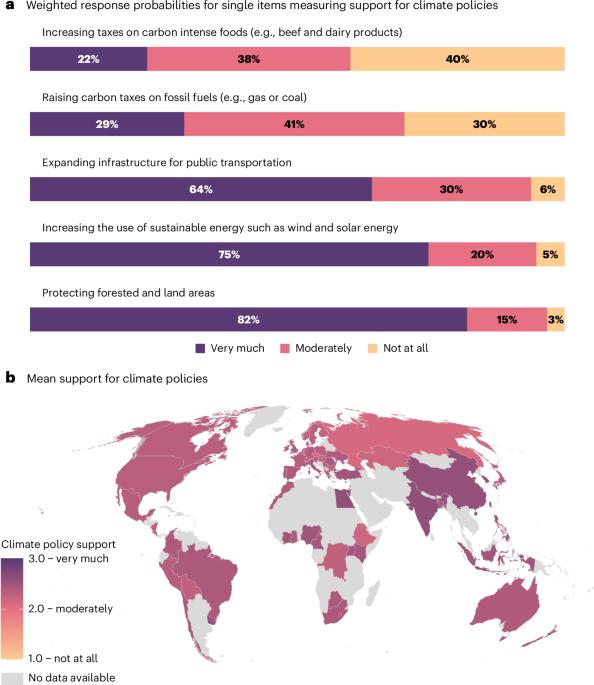Extreme weather event attribution predicts climate policy support across the world
IF 27.1
1区 地球科学
Q1 ENVIRONMENTAL SCIENCES
引用次数: 0
Abstract
Extreme weather events are becoming more frequent and intense due to climate change. Yet, little is known about the relationship between exposure to extreme events, subjective attribution of these events to climate change, and climate policy support, especially in the Global South. Combining large-scale natural and social science data from 68 countries (N = 71,922), we develop a measure of exposed population to extreme weather events and investigate whether exposure to extreme weather and subjective attribution of extreme weather to climate change predict climate policy support. We find that most people support climate policies and link extreme weather events to climate change. Subjective attribution of extreme weather was positively associated with policy support for five widely discussed climate policies. However, exposure to most types of extreme weather event did not predict policy support. Overall, these results suggest that subjective attribution could facilitate climate policy support. Literature produced inconsistent findings regarding the links between extreme weather events and climate policy support across regions, populations and events. This global study offers a holistic assessment of these relationships and highlights the role of subjective attribution.


极端天气事件归因预测全球气候政策支持
由于气候变化,极端天气事件变得越来越频繁和强烈。然而,人们对极端事件的暴露、气候变化对这些事件的主观归因以及气候政策支持之间的关系知之甚少,尤其是在全球南方国家。结合来自68个国家(N = 71,922)的大规模自然科学和社会科学数据,我们开发了一种暴露于极端天气事件的人口测量方法,并研究了暴露于极端天气和极端天气对气候变化的主观归因是否能预测气候政策支持。我们发现,大多数人支持气候政策,并将极端天气事件与气候变化联系起来。极端天气的主观归因与五项广泛讨论的气候政策的政策支持呈正相关。然而,暴露于大多数类型的极端天气事件并不能预测政策支持。总体而言,这些结果表明主观归因可以促进气候政策支持。
本文章由计算机程序翻译,如有差异,请以英文原文为准。
求助全文
约1分钟内获得全文
求助全文
来源期刊

Nature Climate Change
ENVIRONMENTAL SCIENCES-METEOROLOGY & ATMOSPHERIC SCIENCES
CiteScore
40.30
自引率
1.60%
发文量
267
审稿时长
4-8 weeks
期刊介绍:
Nature Climate Change is dedicated to addressing the scientific challenge of understanding Earth's changing climate and its societal implications. As a monthly journal, it publishes significant and cutting-edge research on the nature, causes, and impacts of global climate change, as well as its implications for the economy, policy, and the world at large.
The journal publishes original research spanning the natural and social sciences, synthesizing interdisciplinary research to provide a comprehensive understanding of climate change. It upholds the high standards set by all Nature-branded journals, ensuring top-tier original research through a fair and rigorous review process, broad readership access, high standards of copy editing and production, rapid publication, and independence from academic societies and other vested interests.
Nature Climate Change serves as a platform for discussion among experts, publishing opinion, analysis, and review articles. It also features Research Highlights to highlight important developments in the field and original reporting from renowned science journalists in the form of feature articles.
Topics covered in the journal include adaptation, atmospheric science, ecology, economics, energy, impacts and vulnerability, mitigation, oceanography, policy, sociology, and sustainability, among others.
 求助内容:
求助内容: 应助结果提醒方式:
应助结果提醒方式:


